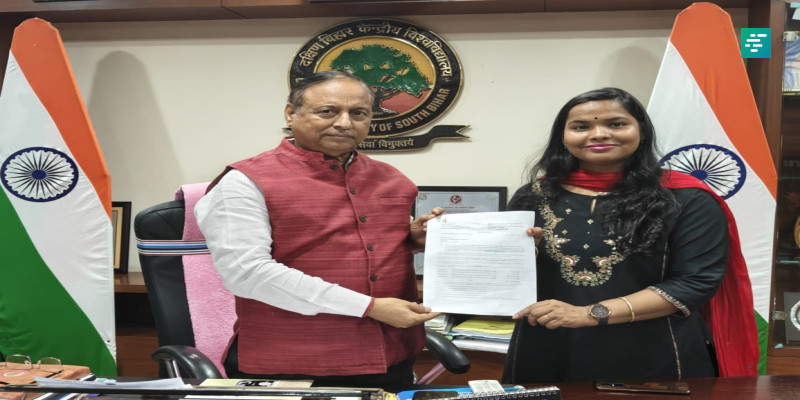
Dr. Rachna Vishwakarma of CUSB Secures ₹1.20 Crore ICSSR Grant for Research on Indian Labor Migration
- Campus Updates
- 17 Sep, 2025
- 26
Dr. Rachna Vishwakarma, Assistant Professor in the Department of Commerce and Business Studies at the Central University of South Bihar (CUSB), has been awarded a prestigious grant of ₹1.20 crore by the Indian Council of Social Science Research (ICSSR), New Delhi. The four-year project will focus on “The Cultural History of Indian Labor Migration during British Colonial Rule.”
The six-member project team, led by Dr. Vishwakarma, will study the global phenomenon of indentured labor migration, particularly from Bihar, during the colonial period. Her research will emphasize the commercial and economic dimensions of the migration process. The project also involves collaboration with four eminent faculty members from Mahatma Gandhi Kashi Vidyapeeth, Banaras Hindu University, and the University of Hyderabad, along with two international researchers from London, bringing together expertise in history, language, education, and commerce.
Congratulating Dr. Vishwakarma, Vice Chancellor Prof. Kameshwar Nath Singh, Registrar Prof. Narendra Kumar Rana, Dean Prof. Subramanian S., Head of Department Prof. Brajesh Kumar, and faculty members hailed the achievement as a milestone for the university. Public Relations Officer (PRO) Mohammad Mudassir Alam described it as a significant collaborative research endeavor.
Sharing details about the project, Dr. Vishwakarma said that the proposal was inspired by the Hon’ble Prime Minister’s 2024–25 visits to Mauritius, Fiji, and Caribbean nations—regions where large communities of Indian indentured laborers had once migrated under British rule. During those visits, the Prime Minister highlighted the importance of global-level research to preserve the heritage of the Girmitiya community.
She emphasized that a substantial number of indentured workers had migrated from Bihar, making the study particularly significant for the state. The research will draw on archival material from Fiji, Mauritius, South Africa, Guyana, Suriname, Trinidad and Tobago, as well as repositories in Britain, Ireland, the Netherlands, and Australia.
According to Dr. Vishwakarma, the migration of Indian laborers during the colonial era was not a natural demographic shift but a carefully designed economic policy by the British to serve their commercial interests through cheap labor supply. This project aims to critically examine those policies and their long-term impacts.
Ultimately, the findings are expected to offer evidence-based insights that can inform policy, strengthen India’s cultural and economic ties with countries shaped by the Girmitiya legacy, and deepen India’s engagement with the global diaspora.
